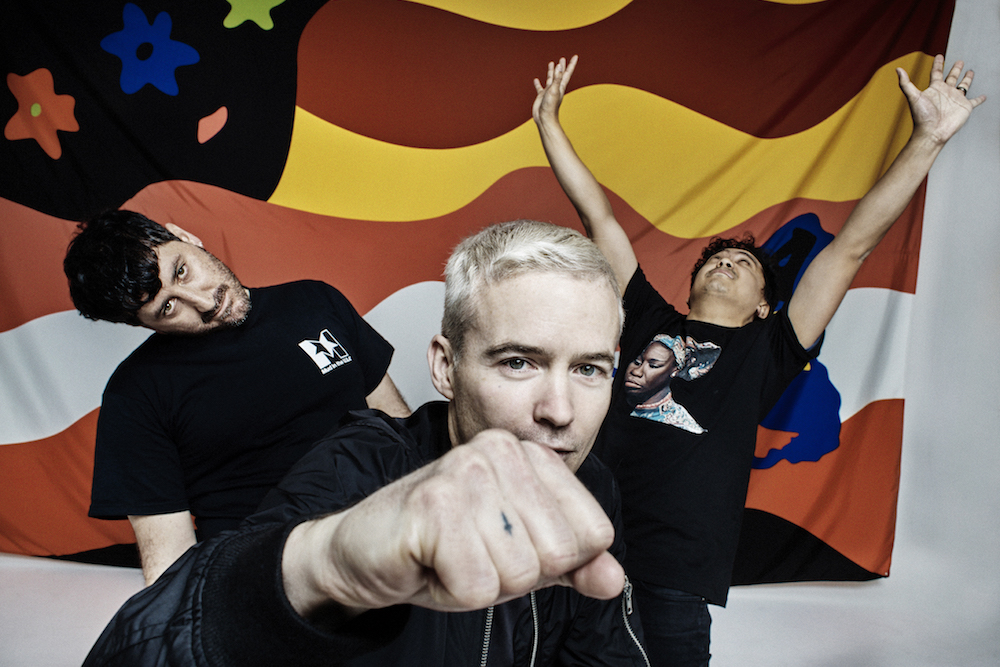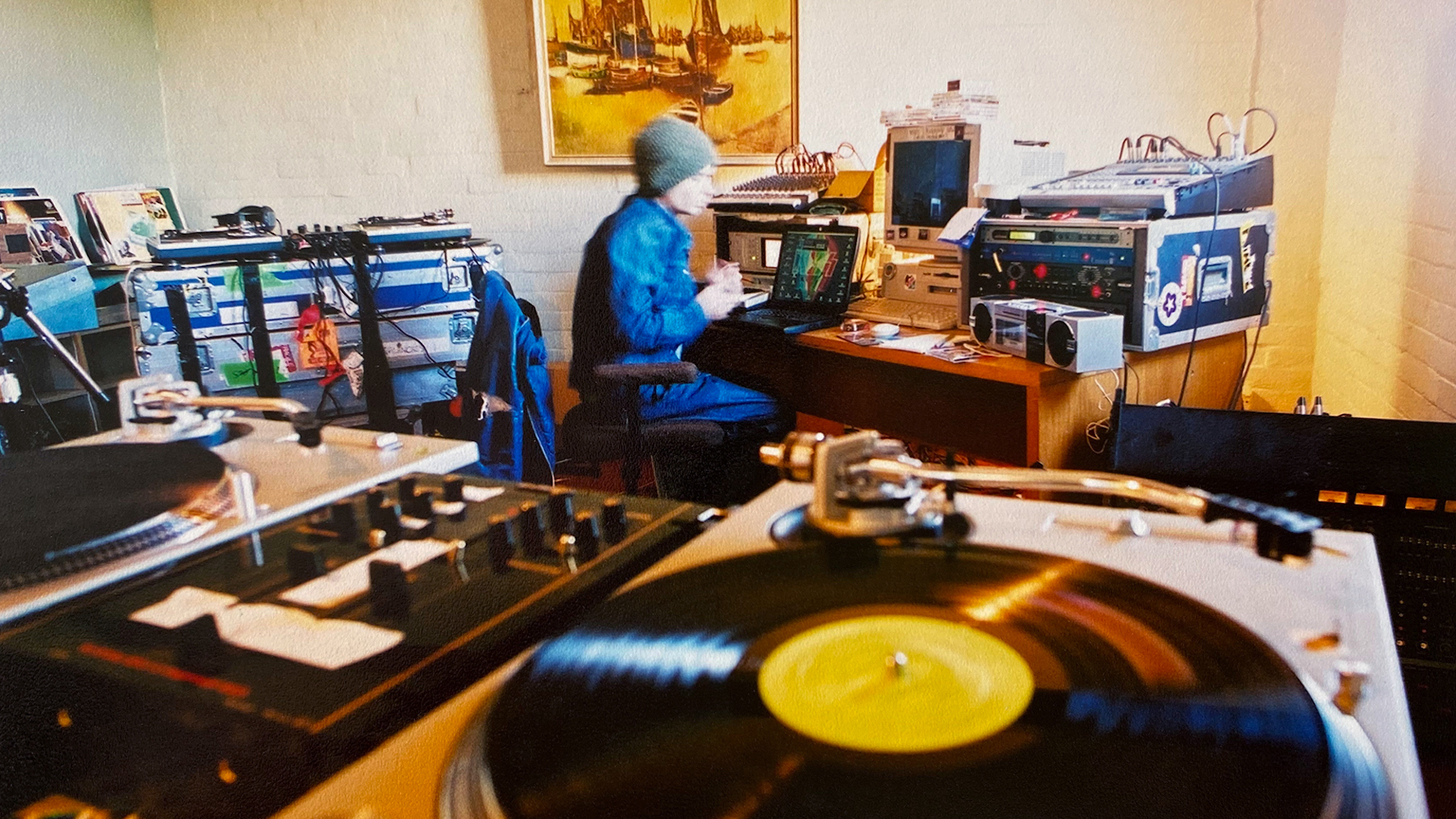Wildflower‘s existence is something of a miracle. The Avalanches’ long-awaited (and just-unveiled) follow-up to their nostalgic plunderphonics classic, 2000’s Since I Left You, comes at a time when sampling laws are strangling their craft. The Australian crew has also undergone some less-than-ideal lineup changes: the group has shrunken from a septet to a trio, losing turntablist Dexter Fabay, multi-instrumentalist Gordon McQuilten, percussionist Peter “Snakey” Whitford, and co-founding member Darren Seltmann in the process. Robbie Chater and Tony Di Blasi were the only members who didn’t quit during the 16-year gap between Since I Left You and Wildflower. Mixer James Dela Cruz rejoined the band last year after a decade-long absence.
So it was somewhat fitting that it was just Chater and Di Blasi performing under the Avalanches’ moniker last month for a Primavera appearance — their first live show in 15 years — that was nearly sunk. Visa issues kept Dela Cruz from joining his mates, who were scrambling to “[pull it] together an hour before showtime.” That slapdash gig was just the final obstacle for a pair of music nerds-turned-acclaimed luminaries to overcome.
“It ended up being like the universe was telling us that Tony and I were meant to share this moment together, having been on this long journey making this record,” Chater told SPIN over the phone in late June, a few weeks after the Primavera set. “It was always meant to be that we’d do this first show together.”
A worthy sequel to an iconic debut, Wildflower answers any possible sampling restrictions by simply including more of everything else. The Avalanches invited a wide breadth of guests to their sophomore outing, including Bronx duo Camp Lo, the one and only Biz Markie, Detroit squawker Danny Brown, and lo-fi enigma Ariel Pink. Still, there are plenty of samples to admire; Chater believes the album has even more than the thousands that populate Since I Left You, which required plenty of patience from the Avalanches — and, consequently, the fans. The result is a kaleidoscopic voyage that doesn’t quite eclipse its predecessor but is no doubt a beauty in its own right.
We spoke with Chater about the making of Wildflower just before it debuted on Apple Music. That conversation, which has been edited and condensed for clarity, is below — get a drink, have a good time now.
What was going through your mind when you finally released “Frankie Sinatra” as the lead single?
It was a sense of relief, especially having had the record finished for a while now. We lived in that period where we thought we were done, but the music doesn’t really exist until it’s been listened to by people. We had our first show in a long time that day, and it just felt amazing to have new music to play. We’ve gotten a lot of offers to play shows over the years, but never really wanted to do them without having new music to share.
It’s been known for a while that you had something with Danny Brown in the works, but how did MF Doom’s guest verse come about?
That just really came about by being a massive fan of his work. We sent him a track, actually, a long time ago. We never heard anything back, we just figured he must be busy, or he didn’t know who we were. Especially being away for 15 years, a lot of people have no idea who we are.
Then one day [18 months later], we got an email saying, “Hey I love this track, I want to do the vocal.” And we were just like, “Whoa!” It was just a complete surprise, I was f**king really happy because I’ve just always loved his music. The album he made with Madlib [Madvillainy] came out four years after Since I Left You, and there aren’t many sample records that really resonate with me and really inspire me. I’ve been listening to that record for ten years.
At what point in making this record did you decide that you wanted to have real vocalists singing, rather than just samples?
It initially happened just on a couple of songs. We were working with [Mercury Rev’s] Jonathan Donahue for quite a long time. It was an exciting new approach, one that, as soon as we started, we realized it was going to be really difficult. We didn’t want the vocalists to sound slapped on or docked on over the top.
We really wanted to make it sound like the vocals were always meant to be there, always part of the song, and they could be a sample. It really required people to be doing it for the love and have the time to go back and forward and back and forward until this feeling came from the vocal that it was locking together so seamlessly that if we didn’t tell you, you wouldn’t know if it was a sample or not. I think we achieved that, eventually.
On our very first shows, we used to play that [1997] Camp Lo record Uptown Saturday Night endlessly. We grew up with that record, and then we sampled Camp Lo on Since I Left You, so there was a lot of continuity from growing up listening to them, and then sampling them on Since I Left You, and then working with them directly on this record.
I remember hearing the “Sparkle” sample on Since I Left You and thinking, “Oh, this is a surprise!”
We just could not ever stop playing that record. In our early shows, we used to load up the old S-900 sampler with floppy discs by hand, and those were the samples for the core of our early live shows. If that sampler ever crashed, we used to always have Uptown Saturday Night on standby just to drop that Camp Lo for a couple of minutes, while we let the sampler reload.
In one of your interviews, you said that you were sampling on the fly when making Since I Left You. Did you go through that same sort of process when making Wildflower?
The process was the same. I think that’s why it sounds like us — that’s our thing. It’s really about chasing a feeling, and then when we’re really feeling it, the momentum can flow really far, and you’re just grabbing bits. While you’ve still got that clear feeling in your head of this track being born, you’ve got to work hard and keep sampling to capture that feeling.
I’ve read that Since I Left You features 3,500 samples. Does Wildflower have anything near that amount of samples?
I’ve got no idea, man. It’s been such a long journey and I would say there’s probably more. It’s so fragmented. Every little footstep and voice and yell and clatter and cowhorn and dog barking, it’s just ridiculous.
Is it more of a hassle to stitch everything together with the sampling laws being so strict these days?
It was a more difficult process. With the first record, nobody knew who we were, so the samples were easier to clear. No negotiations. The negotiations on this record seemed to go on a lot longer: They started clearing them, like, four or five years ago.
How many conceptual shifts did Wildflower go through before you locked down what you wanted to do with the album?
Quite a few. Early on, we stepped away from sampling and Tony was writing a lot of songs on keyboard and guitar, and I was adding samples after that, but we just went and made a lot of tripped-out, droney, ’60s George Harrison’s solo stuff. Luke Steele from the Sleepy Jackson and Empire of the Sun, he flew over from Perth. We’ve got a couple of beautiful songs from that period. The last song of the record, “Saturday Night Inside Out,” is actually from way back then. It was only recently, in the last two years, that we hooked up with [Silver Jews’] David Berman and he helped us find a way to finish that song.
So “Saturday Night” is the oldest on the record?
Yeah, that’s the oldest. That was actually the first piece of music we wrote after Since I Left You. It’s so funny that it’s now ended up being the last song, years later.
That’s kind of poetic, actually.
Yeah, it is. I made all of this music straight after Since I Left You and gave it to the guys in the band, and that was the first song, and we were just like, “Oh, f**k. That song’s got to finish off this record.” It was really cool the way it worked out. It just takes time for all of these little destinies to unfold and things to fall into place.
Did Darren Seltmann’s departure have any effect on Wildflower?
Not musically. I’d always thought him to be the musical engine room of the group. He always had a lot of energy. I’d thought of him as like a big brother to me, always great at helping me edit through stuff and helping me focus. He’s a very confident, charismatic dude — great when we played live. We had that little brother/big brother relationship. At a certain point, he had a kid and a family, and he realized it was going to take a long, long time to finish this record. We just went our own separate ways.
When “Frankie Sinatra” dropped, you said that there were times where you guys didn’t think you were going to make it through the recording of Wildflower. So how does it feel now to have it done and ready for people to hear dropping?
It feels pretty surreal. There were a lot of times where we just thought, “We won’t get there,” especially because you’ve got to pay the bills, you’ve got to pay the rent. Any musician will tell you that it can be tough. There were times when we thought, “F**k, what are we doing? Making records of samples?” We thought, “How are we going to make a living? How are we going to get to the finish line?” In the end, we just ended up maxing credit card after credit card after credit card, and family and friends helped us out. We were so far down the path and we had made a commitment to each other. So we were just like, “F**k it, we’ll finish it.” We’re really proud that we made it to the end.





